
Fishing The Rick McFerrin Signature Swim Jig
Written By Rick McFerrin
Full Time Guide/Owner
Tennessee Bass Guides LLC.
November 2010
www.tennesseebassguides.com
ALL SIZES AND COLORS AVAILABLE AT THE LOCATIONS BELOW
murfreesboro
Outdoors 2204 North West Broad in Murfreesboro
Lil
Joes Outdoors
305
Sparta
Street McMinnville Tn
Poindexters
Bait Shop Hwy 109 Gallatin Tn.
Barton Spring
Gro/Bait Riley Creek Road Lake Normandy
Home Supply
Highway 25 Carthage Tn.
Grandpas 1894
Ft. Campbell Blvd,Clarksville Tn.
Broadview Market
Highway 50 Winchester Tn.
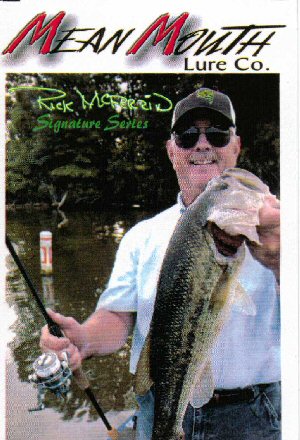 This
article is intended to help the Beginning Fisherman better
understand the techniques that work best for me on a
deep clear lake
fishing a "Finesse Swim Jig"
for Smallmouth, Largemouth, Spotted Bass. This
IS NOT a heavy rod, heavy line article. But rather these techniques
incorporate using the Rick McFerrin Signature Swim Jigs weighing 3/16th and
1/4 ounce, 6lb and 8lb test line, long rods and open faced spinning reels.
Let me say that this is not the only way to catch bass on a
swim jig, but the light jig light line finesse techniques that I will be
sharing fits my fishing style perfectly and has proven to be very effective
for me. There are several other articles that I have written on various
baits to help the Beginner that you can view by going to
www.tennesseebassguides.com and clicking on the Tips Archive Tab on the
left hand side of the home page.
This
article is intended to help the Beginning Fisherman better
understand the techniques that work best for me on a
deep clear lake
fishing a "Finesse Swim Jig"
for Smallmouth, Largemouth, Spotted Bass. This
IS NOT a heavy rod, heavy line article. But rather these techniques
incorporate using the Rick McFerrin Signature Swim Jigs weighing 3/16th and
1/4 ounce, 6lb and 8lb test line, long rods and open faced spinning reels.
Let me say that this is not the only way to catch bass on a
swim jig, but the light jig light line finesse techniques that I will be
sharing fits my fishing style perfectly and has proven to be very effective
for me. There are several other articles that I have written on various
baits to help the Beginner that you can view by going to
www.tennesseebassguides.com and clicking on the Tips Archive Tab on the
left hand side of the home page.
What is A Rick McFerrin Finesse Swim Jig?
Over 6 months or more ago Tim
and Cinnamon Turrentine owners of Tennessee based Mean Mouth Lure
Company and I began working on my Signature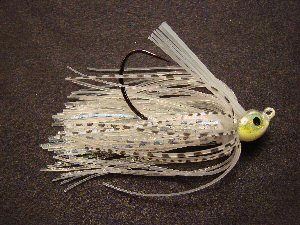 e
Swim Jig Series. What attracted me to these two fine folks was their
100% commitment to producing the highest quality lures possible.
That makes a difference to me because I have built my reputation on
endorsing only top notch products. And I'm certainly not going to
put my name on anything that's not of the highest quality. It
matters to me and I believe matters to the vast majority of serious
bass fishermen as well.
e
Swim Jig Series. What attracted me to these two fine folks was their
100% commitment to producing the highest quality lures possible.
That makes a difference to me because I have built my reputation on
endorsing only top notch products. And I'm certainly not going to
put my name on anything that's not of the highest quality. It
matters to me and I believe matters to the vast majority of serious
bass fishermen as well.
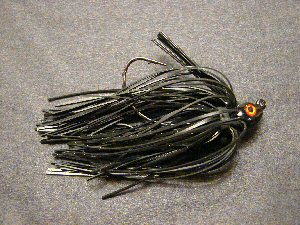 Let's
discuss the WHAT IS question first, then we will look at the why-where-when
and how of using this swim jig. I think the best place to start is by
telling you what my finesse swim jig isn't. These are not
specifically designed to be a pitching, flipping or bottom bumping bait.
They are designed to imitate baitfish and crawfish using various swimming
techniques. Also where most swim jigs range from 1/4oz as the lightest
to 1/2 ounce or more as the heaviest. My swim jig starts at 3/16th oz as the
lightest and 1/4 oz as the heaviest. I have found through trial and error
that with my style of fishing light lines these two smaller weights
consistently produce more fish for me on the clear deep lake
that I guide on. My jig will also excel on lakes that have a tremendous
amount of traffic and pressure. Lakes like Priest or Old
Hickory if you live here in middle Tennessee or a high pressured lake in
your area.
Let's
discuss the WHAT IS question first, then we will look at the why-where-when
and how of using this swim jig. I think the best place to start is by
telling you what my finesse swim jig isn't. These are not
specifically designed to be a pitching, flipping or bottom bumping bait.
They are designed to imitate baitfish and crawfish using various swimming
techniques. Also where most swim jigs range from 1/4oz as the lightest
to 1/2 ounce or more as the heaviest. My swim jig starts at 3/16th oz as the
lightest and 1/4 oz as the heaviest. I have found through trial and error
that with my style of fishing light lines these two smaller weights
consistently produce more fish for me on the clear deep lake
that I guide on. My jig will also excel on lakes that have a tremendous
amount of traffic and pressure. Lakes like Priest or Old
Hickory if you live here in middle Tennessee or a high pressured lake in
your area.
This is very important, although the weights are different,
the head size, line tie and profile of both sizes are exactly the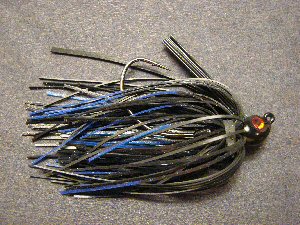 same. We achieved keeping the head sizes the same by combining
different alloys to lighten up the 3/16th oz jig. Keeping the same size
head, profile and line tie position is very important to me because of the
keel like effect that this head creates. These jigs will lift up, run
straight and won't veer off from one side to another. It has been my
experience that swim jigs have to run straight to be consistently productive
and these do just that. I like the way the water moves off of the
head, it's subtle but very effective. Many times little things can make a
big difference and I believe that this is one of those.
same. We achieved keeping the head sizes the same by combining
different alloys to lighten up the 3/16th oz jig. Keeping the same size
head, profile and line tie position is very important to me because of the
keel like effect that this head creates. These jigs will lift up, run
straight and won't veer off from one side to another. It has been my
experience that swim jigs have to run straight to be consistently productive
and these do just that. I like the way the water moves off of the
head, it's subtle but very effective. Many times little things can make a
big difference and I believe that this is one of those.
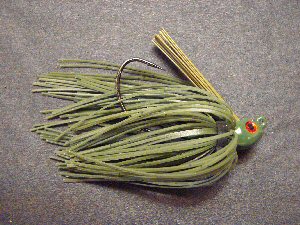 One
of my major pet peeves with many jigs is when you use them 1/2 a day
and the paint is gone off the head. Or the eyes are missing and your
left with a bare lead head. NO JIG is indestructible
including mine, but I will tell you this. We have gone to
great lengths
using a very time consuming, labor intensive process to assure that
the finish on these jigs are rock hard and will give you many hours
of service.
One
of my major pet peeves with many jigs is when you use them 1/2 a day
and the paint is gone off the head. Or the eyes are missing and your
left with a bare lead head. NO JIG is indestructible
including mine, but I will tell you this. We have gone to
great lengths
using a very time consuming, labor intensive process to assure that
the finish on these jigs are rock hard and will give you many hours
of service.
Another pet peeve is when you
get hung up and jerk a couple times the weed guard pulls out of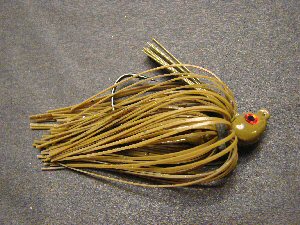 the head. Once again the process and materials that we use reduce
the chances of that happening immensely. I can't stress this
enough
these are not foreign machine
produced jigs but
rather assembled diligently 1 at a time right here in middle
Tennessee to assure strict optimum quality control. When you combine
the Rock Hard Finish, the 3-D Eyes, Razor Sharp 28 degree Premium
Mustad Hooks, approximately 38 strands Top Quality Color
Matched Skirt material that creates a subtle breathing effect and
Rattle Bands (when needed) these swim jigs are almost a work of art.
It's important for you to know that the way we positioned the 28
degree hook tends to help stick the bass right in the roof of their
mouth where you want them stuck.
the head. Once again the process and materials that we use reduce
the chances of that happening immensely. I can't stress this
enough
these are not foreign machine
produced jigs but
rather assembled diligently 1 at a time right here in middle
Tennessee to assure strict optimum quality control. When you combine
the Rock Hard Finish, the 3-D Eyes, Razor Sharp 28 degree Premium
Mustad Hooks, approximately 38 strands Top Quality Color
Matched Skirt material that creates a subtle breathing effect and
Rattle Bands (when needed) these swim jigs are almost a work of art.
It's important for you to know that the way we positioned the 28
degree hook tends to help stick the bass right in the roof of their
mouth where you want them stuck.
We are off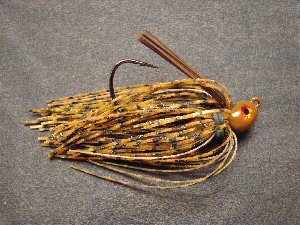 ering
8 of my favorite colors that have work for me on Tim's clear water
in both the 3/16th and 1/4 oz sizes. The colors are Brown, Thread
Fin-Shiner-Black/Blue-Olive Green-Pumpkin Pepper-Black and Gold
Pumpkin. I will give you my personal guarantee that we have
taken every precaution to make sure that we put in your hands the
absolute best jig that we can produce. Try them and see for your
self. Get back with me at
rickm@dtccom.net and let me
know what you think.
ering
8 of my favorite colors that have work for me on Tim's clear water
in both the 3/16th and 1/4 oz sizes. The colors are Brown, Thread
Fin-Shiner-Black/Blue-Olive Green-Pumpkin Pepper-Black and Gold
Pumpkin. I will give you my personal guarantee that we have
taken every precaution to make sure that we put in your hands the
absolute best jig that we can produce. Try them and see for your
self. Get back with me at
rickm@dtccom.net and let me
know what you think.
Where-Why-When-How Do I Fish The Rick McFerrin
Swim Jig ?
Where is a very easy question to answer. My
swim jig can be used anywhere because of the weights and head
design. Lakes-ponds-river systems-from a boat or from the bank. I
fish them on my home lake around boat docks-low hanging dock walk
ways-standing and lay down timber-bridge pillars-pea gravel and chunk rock
banks-bluff banks-boat ramps and open water surfacing or suspended fish.
They also work well fishing just above submerged grass and
vegetation-cypress trees and knees-lily pads-in current, wind or calm water.
Your swimming pool-your aquarium-your kitchen sink and ????? Where
ever the fish are that's where this jig can be used! It's just a matter of
the "right" where and the "right" technique.
Why is another easy question to answer.
(1) Most importantly they consistently produce. Folks they work! (2) My jig
is designed where you can keep them very small and subtle which can make a
tremendous difference in clear water and when the fish are shallow and
spooky. There are many times when the vibrating sound of a crank bait or the
higher pitched sound of a spinner bait blade turns the fish off. Not so with
this little package.
(3) On the other hand with the addition of various size and
designed tails you can increase the water turbulence and the over all
profile of the bait when the fish are more aggressive. (4) It's extremely
versatile, you can retrieve the jig in multiple ways which we will discuss
shortly. (5) Because of the light weight the fall rate is much slower than
heavier jigs which at times is the difference between success or failure
(6) It's versatility helps you cover a lot of different types
of structure and water in a sort amount of time. (7) Because of the
design they don't get hung up as much as other baits (8) They make a great
back up to a spinner baits especially when the wind dies (9) By using
different colors you can imitate various bait fish like shad-or crawfish and
bluegill which are all well within a bass diet. Unless the current
administration get's involved. Then you will only be able to use them in a
health food store with tofu trailers. And the list go's on.
When I don't believe that there is a "SEASON" for our swim jig.
I believe that it can work 12 months out of the year. Why do I believe that?
We designed these jigs to produce a "reaction strike".
For those of you reading this article and fish a clear water lake
let me ask you a question. How many times have you come up on a school of
bass and you get one or maybe two out of the school on a crank bait, spinner
bait or maybe a jerk bait and then they become "spooked"? But you just keep
chucking the same bait in the same areas until you have created a froth on
the water with no results. Chances are they got spooked from the barrage of
incoming missiles that we were throwing. But this swim jig doesn't spooks
fish like that because of the subtleness of the light size and line weights.
Now before someone go's off the deep end read the rest of
this statement please. Are there times that you can hoist one bass after
another over the rails on most any other type of bait?
Absolutely I
prove that to be true myself year after year. But what's going on when they
won't hit these other baits? Or they turned off almost as quickly as they
turned on? Over the years I've scratched a bald spot on my head
wondering "where did they go?".
On Tim's Ford the deep clear lake
where I guide I can tell you this. Unless the bass was in the process of
chasing bait over a distance, the where did the go question is fairly easy
to answer. They didn't go anywhere. They just ran for the nearest cover
closed their mouths and stopped. That's when you give this area a
break, fish some where else for a while then come back with our swim jig and
maybe pick up another fish or two because they aren't intimidated by it. It
swims by, it's small and compact doesn't make any kind of rattling noise and
they have to take a shot. Does this strategy work 100% of the time
"WHAT?" "WHAT" Nothing works 100% of the time but I have watched this work
countless times over a years period, and it will work for you as well.
I do struggled with a swim jig in cold muddy water even when I bulk up the
size. Other types of jigs made for that condition works much better.
How This is the
nuts and bolts of this article. And once again let me
say that this is not the only way to catch bass on a swim jig,
but the light jig light line finesse techniques the we are getting ready to
talk about fits my fishing style perfectly and has proven to be very
effective for me. Let me stress this is not a bottom bouncing,
flipping, pitching or bottom dragging technique.
I use a 7 foot medium or a 7 foot medium heavy action
spinning rod with a 6.2:1 spinning reel loaded with Sufix Pro mix 6lb or 8lb
test clear blue mono. www.sufix.com This
line in unbelievably strong,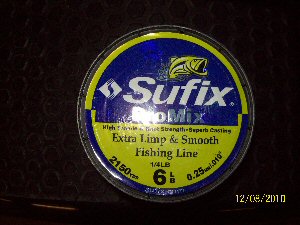 ultra abrasion resistant but yet comes off my spinning real smooth as silk.
This is necessary because I make as long of a cast as possible. I'm a
line watcher and the clear blue gives me the ability to watch my line for
those "little ticks" that my 62 year old eyes miss with fluorocarbon
lines. The clear blue seems to have no negative effect on the fish, as a
matter of fact it is the exact same line I use with all my Rapala
www.rapala.com -Storm
www.stormlures.com and Luhr-Jensen
Crank baits. www.luhrjensen.com And
as I said is easy on the eyes.
ultra abrasion resistant but yet comes off my spinning real smooth as silk.
This is necessary because I make as long of a cast as possible. I'm a
line watcher and the clear blue gives me the ability to watch my line for
those "little ticks" that my 62 year old eyes miss with fluorocarbon
lines. The clear blue seems to have no negative effect on the fish, as a
matter of fact it is the exact same line I use with all my Rapala
www.rapala.com -Storm
www.stormlures.com and Luhr-Jensen
Crank baits. www.luhrjensen.com And
as I said is easy on the eyes.
Now let's talk about rigging both our 3/16th and 1/4oz jigs.
I use a variety of trail ers
that are manufactured by Prowler Pro Pitch Lure Company located in
Leitchfield KY. www.prowlerlures.com
is their web address and phone number is 1-270-287-9024. Prowler
manufactures an extensive line of soft plastic baits that will meet the need
of any fisherman. Many tackle shops carry an full line of the Prowler
product but should you not have it in your area you can order directly from
them. Sorry for the small photo but hopefully this will
ers
that are manufactured by Prowler Pro Pitch Lure Company located in
Leitchfield KY. www.prowlerlures.com
is their web address and phone number is 1-270-287-9024. Prowler
manufactures an extensive line of soft plastic baits that will meet the need
of any fisherman. Many tackle shops carry an full line of the Prowler
product but should you not have it in your area you can order directly from
them. Sorry for the small photo but hopefully this will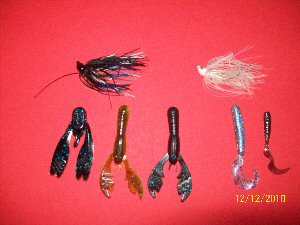 give you a good idea of what I use. Depending on how subtle I want to
make the jig I will use either the 4.5 inch Prowler Pro Fat Grub or the
smaller Pro Grub . There are times when a little more turbulence (noise)
is needed and that's when I opt for the Prowler Pro Craw Chunk or the
Prowler Flappin Craw. At times I will also add a rattle to our rattle band.
This combination also works well when we have dirtier water in the upper
part of the lake or in the backs of creeks after a big rain. Both of these
add a little more bulk to the jig and creates a totally different silhouette
in the water. There are times when I will shorten the Flappin Craw or switch
from the larger Pro Grub to the smaller Pro Grub if I'm getting repeated
short strikes.
give you a good idea of what I use. Depending on how subtle I want to
make the jig I will use either the 4.5 inch Prowler Pro Fat Grub or the
smaller Pro Grub . There are times when a little more turbulence (noise)
is needed and that's when I opt for the Prowler Pro Craw Chunk or the
Prowler Flappin Craw. At times I will also add a rattle to our rattle band.
This combination also works well when we have dirtier water in the upper
part of the lake or in the backs of creeks after a big rain. Both of these
add a little more bulk to the jig and creates a totally different silhouette
in the water. There are times when I will shorten the Flappin Craw or switch
from the larger Pro Grub to the smaller Pro Grub if I'm getting repeated
short strikes.
What about choosing the color of the jig and trailer?
If the bass have been feeding on crawfish there's a couple
things to keep in mind here in Tennessee. The TWRA biologists have completed
extensive studies on crawfish native to Tennessee. They have found in most
of our waters the body colors of crawfish can be brown/black , green,
almost a orange red and many times a pale blue purple. So I tend to choose
our swim jigs in Brown, Olive Green, Pumpkin Pepper and Golden Pumpkin jig
with a Prowler trailer that corresponds to the predominate color of the
crawfish in the lake at the time. If shad has been their primary diet
I will choose our Shiner or Thread Fin jig with a a Smoke Purple, Smoke
Glitter, Minnow Flash, Pearl or Purple Shad Prowler trailer. If Bluegill
seems to be what the bass are after especially in the spring I like to throw
our Brown with a Smoke Purple Prowler Trailer. Then there is our old
reliable Black or Black and Blue swim jig with a June Bug, Smoke Purple or
Black and Blue Prowler Trailer that produces on Tim's clear or stained water
year around. I always glue my trailers on with superglue which helps to keep
the trailer where it needs to be and extends it's life.
What about the retrieve?
Most of the time I keep it coming using a constant
retrieve much like you would with a spinner bait within a foot or two of the
surface. In the clear water on Tim's the bass can see this bait from a long
way off and they will come up out of the deep water just like they do on a
swim bait to nail it. Because of water depth I try to parallel the banks on
Tim's as much as possible making sure that that I bump into every lay down ,
flat rock and extended boulder that I can. We have designed the weed guard
to be forgiving enough to allow a great hook set but yet doesn't hang up
like many other jigs seem to do. Around docks I work all the outside
areas, skip under docks and work the back side between the dock and the bank
as thoroughly as I can. On bridge pillars I work all corners and
parallel both longer sides. Remember this is a reaction strike bait
that can give you multiple fish out of a open water suspended school, or
multiple fish staged on rounds and off long points. By doing a little
experimenting with our 3/16ths and the 1/4oz swim jigs and the size of
the trailer it won't be long before you can get a good idea on the speed of
retrieve that will work for you.
I know someone is asking the question. DO YOU EVER CHANGE
UP THE TYPE OF RETRIEVE? Occasionally I do but it tends to be more of a
PAUSE
in the retrieve or when the water is extremely
hot in the summer I will use a more erratic retrieve using short snaps or
twitches with the rod to see if that will produce more strikes. But
let me stress again 90% of my time swimming my signature jig
I KEEP IT COMING!
To repeat myself over again
this is not the only way to fish a swim jig, but it is the way that has
proven to work for me over and over.
I hope this article will give you some
additional information that will help you on your next trip. When you
can pick up a Rick McFerrin Signature Swim Jig and try it for your self.
Thank you for visiting my site.
Rick McFerrin
www.tennesseebassguides.com